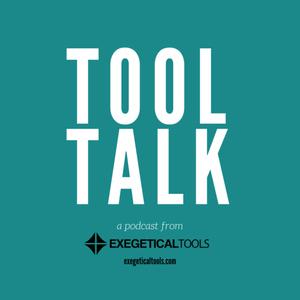
Tool Talk
Exegetical Tools
Welcome to Tool Talk from Exegetical Tools, where we discuss sound practices and solid resources for students of the Scriptures. Host Travis Montgomery sits down (or rings up) pastors, scholars, and students to ask them about tools they're using to stu...
- 41 minutes 54 secondsLanguage Tools, Learning Trends, and the New THGNT-ESV Parallel Bible
After Crossway partnered with Tyndale House to produce a new Greek New Testament, it was only a matter of time before a THGNT-ESV parallel Bible was produced. How can students of the Scriptures benefit from these tools? How can seminaries and Bible colleges train students to use tools like these? What is the goal of language learning for exegetes?
Check out this episode on exegeticaltools.com and follow on social media @exegeticaltools.16 November 2020, 2:00 am - 32 minutes 44 secondsVisual Outline Charts of the New Testament | Scott Bashoor
Can the importance of context be visualized?
A unique and innovative resource, Visual Charts of the New Testament (SCS Press, 2020) introduces, surveys, and outlines every book of the NT in single-page charts, breaking them into discourse units and smaller sub-sections.
In this episode of Tool Talk, Travis interviews author Scott Bashoor, faculty associate and instructor at The Master's Seminary and University and co-pastor at Community Bible Church in Anaheim, CA.
Thinking in terms of discourse and outlining Scripture visually can help Bible teachers, Bible preachers, and Bible readers display how the parts relate to the whole and better understand the Word.25 June 2020, 2:00 am - 50 minutes 30 secondsInterpreting Scripture Like It's Inspired | Matthew Barrett
The Gospels don't have a 'lower' Christology than Paul, so why has this claim gained ground?
To answer this question, Matthew Barrett considers the nature of Scripture, the definition of biblical theology, and the role of systematics in exegesis.
Barrett has taken on these challenges in Canon, Covenant, and Christology: Rethinking Jesus and the Scriptures of Israel, the latest entry in the excellent New Studies in Biblical Theology series (NSBT), published by IVP Academic and edited by D. A. Carson.
Barrett, associate professor of Christian theology at Midwestern Seminary and Executive Editor of Credo Magazine, argues that a lack of emphasis on the Divine Author of the Scriptures leads one to devalue typology and miss the high Christology of the Gospels.
Additional Resources:- "Doing Biblical Theology with Geerhardus Vos" (Tool Talk)
- New Dictionary of Biblical Theology, edited by Brian Rosner, T. Desmond Alexander, Graeme Goldsworthy, and D. A. Carson
- A Theology of John's Gospel and Letters by Andreas J. Köstenberger
View this episode on exegeticaltools.com for more great resources!
22 March 2020, 8:00 pm - 52 minutes 20 secondsThe Task of a Biblical Scholar | Andreas Köstenberger
What does a biblical scholar do? Andreas Köstenberger's answer is simple, but he has applied it in his own career in a variety of ways.
Dr. Köstenberger serves as Research Professor of NT and Biblical Theology at Midwestern Baptist Theological Seminary, Director of the Center for Biblical Studies, Founder of Biblical Foundations, Editor of the Journal of the Evangelical Theological Society. Köstenberger is a prolific author in areas including biblical studies, hermeneutics, biblical theology, the biblical view of family, and more.
In this episode of Tool Talk, Travis asks Dr. Köstenberger about a range of topics, including his career, his current sense of calling, the nature of biblical theology, scholars he admires, his forthcoming works, what he's been learning, and Kansas City BBQ.
Resources from Andreas Köstenberger:- The Jesus of the Gospels: An Introduction (Kregel, forthcoming)
- Handbook on Hebrews Through Revelation (Baker, forthcoming)
- Going Deeper with New Testament Greek (with Benjamin Merkle and Robert Plummer, B&H Academic)
- A Theology of John's Gospel and Letters (Zondervan Academic)
- Many More
7 January 2020, 4:00 am - 49 minutes 5 secondsHow Does the New Testament Use the Old Testament?
Christians have one Bible with two testaments, and the New Testament authors frequently refer back to the Old Testament Scriptures. But they don't only point to prophecies that have been fulfilled or directly quote OT passages. In this episode, joined by co-host Taylor DiRoberto, Travis gives an overview of the NT use of the OT and considers some trickier examples.
Going to ETS 2019 in San Diego? Reach out to Travis to chat about Tool Talk, Exegetical Tools, Fontes Press, Midwestern Seminary, or whatever!
Travis's ETS 2019 presentation: "An Ironic Redemption: The Use of Psalm 2 LXX in Luke 23:1-25," Friday, Nov 22, 3:30-4:10 PM, Grand Hyatt - Pyramid Peak.
Featured Resources:- Accelerate (Five-Year BA and MDiv) at Spurgeon College
- The Timothy Track (Residential MDiv Internship and Scholarship) at Midwestern Seminary
- Commentary on the New Testament Use of the Old Testament by G. K. Beale and D. A. Carson
- Handbook on the New Testament Use of the Old Testament by G. K. Beale
- A New Testament Biblical Theology: The Unfolding of the Old Testament in the New by G. K. Beale
- Echoes of Scripture in the Letters of Paul by Richard B. Hays
- Echoes of Scripture in the Gospels by Richard B. Hays
- New Testament Theology: Magnifying God in Christ by Thomas Schreiner
- Matthew, Disciple and Scribe: The First Gospel and Its Portrait of Jesus by Patrick Schreiner
- Biblical Theology of the New Testament by Peter Stuhlmacher
- The Ways of Our God: An Approach to Biblical Theology by Charles Scobie
19 November 2019, 6:00 am - 36 minutes 6 secondsPaul and Plato? Two Errors with Pagan Parallels | Joseph Dodson
What has Athens to do with Jerusalem? What does philosophy have to do with the New Testament? In Acts 17, Paul answered, "Plenty!" In this episode of Tool Talk, Travis chats with Joseph Dodson about two common errors when it comes to studying extrabiblical parallels to Scripture, especially in Greco-Roman philosophy. Dodson (PhD, Aberdeen) is associate professor of New Testament at Denver Seminary and co-editor (with David Briones) of Paul and the Giants of Philosophy: Reading the Apostle in Greco-Roman Context (IVP Academic, 2019).
Follow along @exegeticaltools and visit exegeticaltools.com for more great resources to help you rightly divide the Word of Truth.
Additional Resources:- Paul and the Gift by John Barclay
- Paul and the Faithfulness of God by N. T. Wright
- Paul and Seneca in Dialogue by Dodson and Briones
- Paul and the Greco-Roman Philosophical Tradition, edited by Dodson and Andrew Pitts
- "Stoicism and Christianity: Professor Joseph Dodson on Similarities & Differences" on the Daily Stoic
20 October 2019, 5:00 am - 45 minutes 3 secondsMeeting God in the Bible: Devotions and Academics | John Linebarger
How is so-called "devotional" reading of the Bible different from so-called "academic" reading of the Bible? Why must the serious student of Scripture make time for both? How can the methodical and inquisitive reader make Scripture reading a time of worship? In this episode of Tool Talk, Travis asks these questions and more of John Linebarger, a "collector of degrees," bivocational minister, and author of Meeting God in the Bible: How to Read Scripture Devotionally (Fontes Press, 2019).
Follow along: @exegeticaltools
Featured resources: exegeticaltools.com2 October 2019, 2:00 am - 46 minutes 4 secondsMore than Citation: Matthew's Use of the OT | Patrick Schreiner
Matthew’s use of the Old Testament portrays Jesus as the ultimate fulfillment of the Old Testament story. But Matthew doesn’t do this with just citations and quotations of specific OT texts. In this episode of Tool Talk, Travis chats with Patrick Schreiner (Assistant Professor of NT Language and Literature, Director of the ThM Program, Western Seminary) about Matthew’s narrative allusions and Schreiner’s new book, Matthew, Disciple and Scribe: The First Gospel and Its Portrait of Jesus (Baker Academic). Learn more at exegeticaltools.com, and follow ET on social media @exegeticaltools.
3 September 2019, 2:00 am - 49 minutes 27 secondsJonah as Literature | Sam Bierig
What does the book of Jonah want readers to think and do? Beyond the history and apologetics involved, many readers are unaware of the important literary cues in Jonah. Sam Bierig, Dean of Spurgeon College at Midwestern Seminary, has been studying, writing, and preaching Jonah and wants Christians to hear the cues and see the book as it is. What's more, he wants college students to focus on souls and Scripture as they learn and train for the Kingdom.
Find featured resources at exegeticaltools.com and follow ET at @exegeticaltools
Learn more about Spurgeon College at spurgeoncollege.com31 July 2019, 12:00 am - 40 minutes 31 secondsDispensational Hermeneutics | Cory Marsh
Dispensationalism: It's not just about the end times; it's also about exegesis. As Cory Marsh, Associate Professor of New Testament at the College at Southern California Seminary, points out, it's largely about hermeneutics. In this episode of Tool Talk, Travis chats with Cory about the exegetical commitments of dispensational thought. A member of the Council on Dispensational Hermeneutics and a founding member of the Center for Dispensational Thought, Marsh has contributed to the conversation in presentations, articles, and books, including Forged from Reformation: How Dispensational Thought Advances the Reformed Legacy (Contributor, SCS Press, 2017) and a forthcoming historical theology of dispensationalism.
View this episode on exegeticaltools.com for more resources, and follow ET on social media @exegeticaltools10 July 2019, 1:00 am - 43 minutes 48 secondsIntertextuality: What and When? | Brian Koning
Throughout Scripture, one author will recall the words or themes of an earlier author, whether through a quotation, allusion, or echo. How do exegetes identify these cases of intertextuality? What is their importance? On this episode of Tool Talk, Travis talks with Brian Koning, an adjunct professor of theology at Grand Canyon University researching Habakkuk’s allusions to Job. Travis and Brian also discuss the role of an adjunct professor and how that responsibility meshes with doctoral studies. Listen in at exegeticaltools.com for links to featured resources, and follow ET at @exegeticaltools.
2 June 2019, 11:00 pm - More Episodes? Get the App
Your feedback is valuable to us. Should you encounter any bugs, glitches, lack of functionality or other problems, please email us on [email protected] or join Moon.FM Telegram Group where you can talk directly to the dev team who are happy to answer any queries.
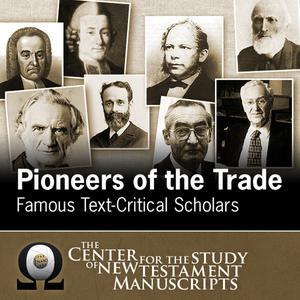 Pioneers of the Trade: Famous Text-Critical Scholars
Pioneers of the Trade: Famous Text-Critical Scholars
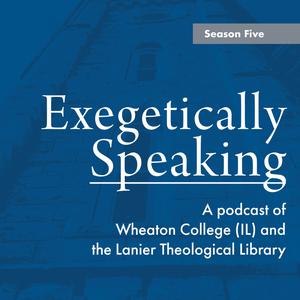 Exegetically Speaking
Exegetically Speaking
 The Master Lectures Podcast
The Master Lectures Podcast
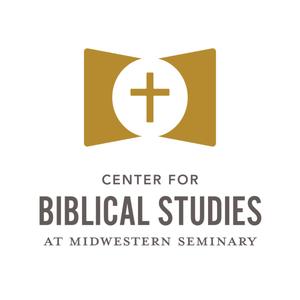 The Center for Biblical Studies Podcast
The Center for Biblical Studies Podcast
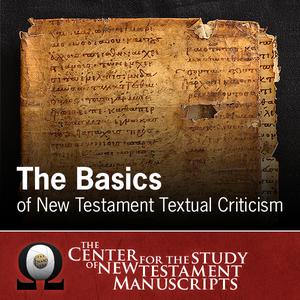 The Basics of New Testament Textual Criticism
The Basics of New Testament Textual Criticism
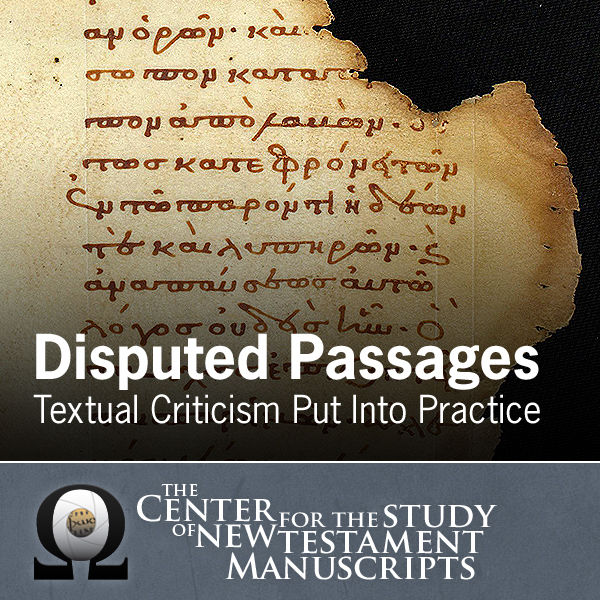 Disputed New Testament Passages: Textual Criticism Put Into Practice
Disputed New Testament Passages: Textual Criticism Put Into Practice